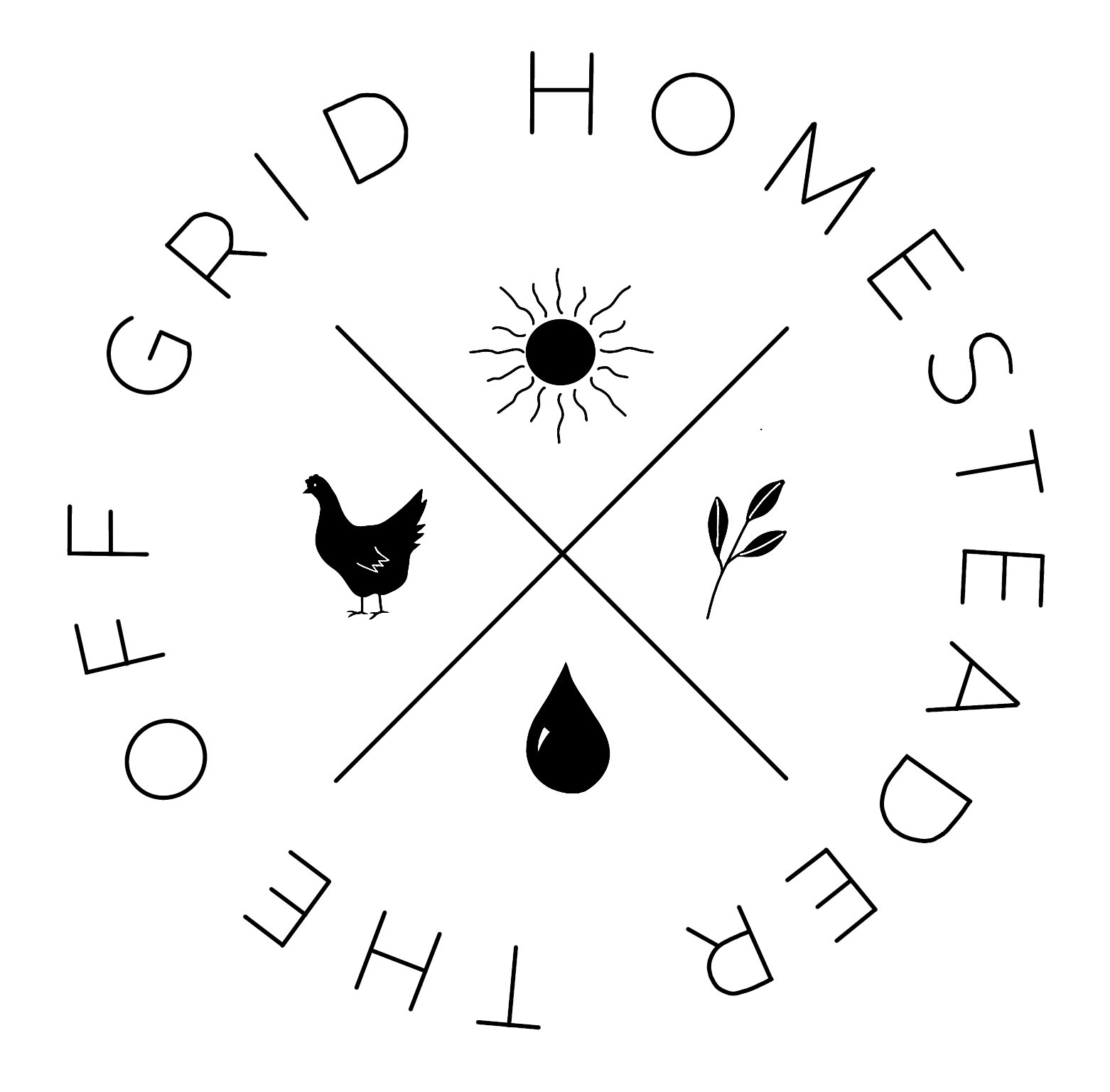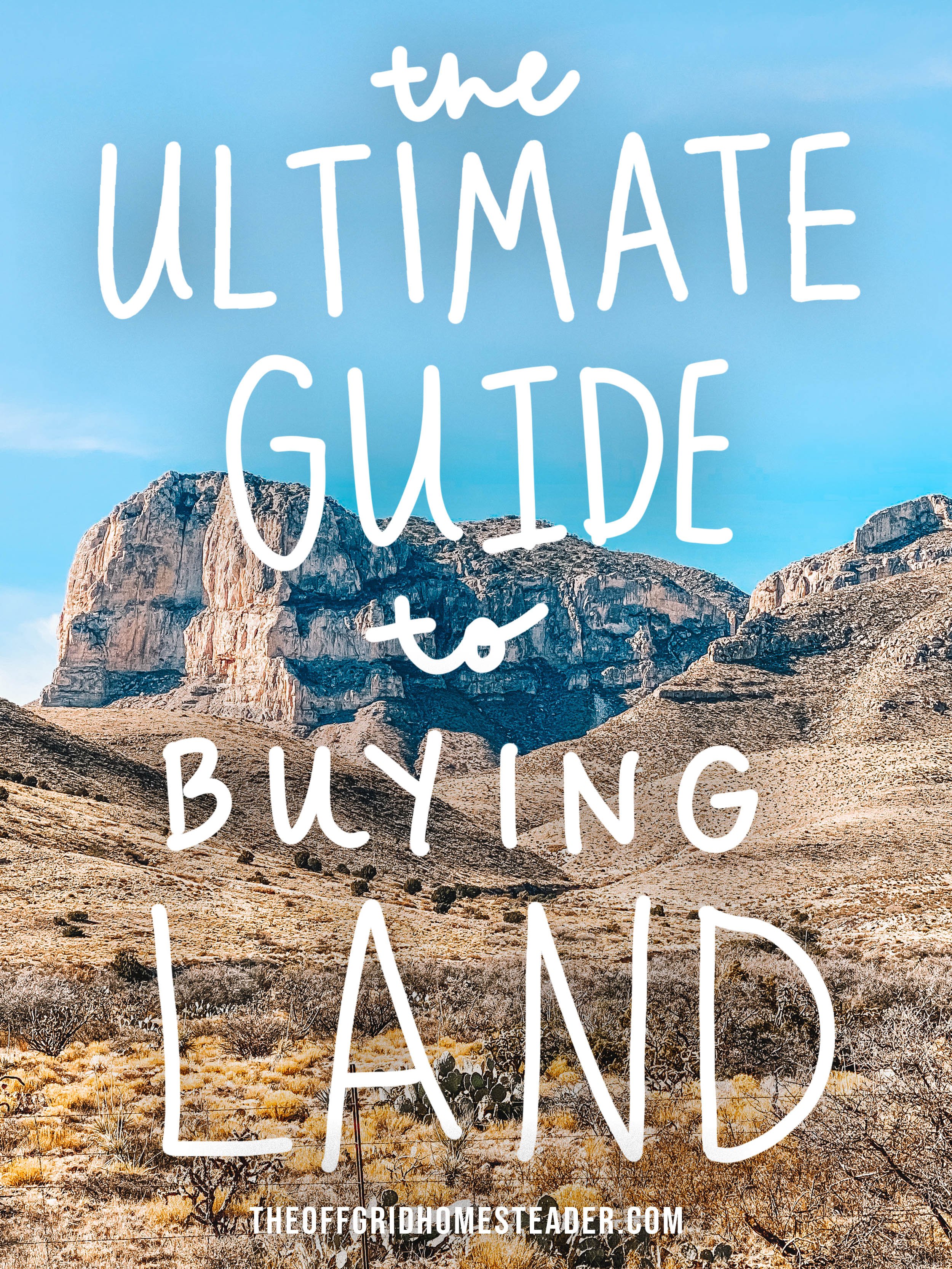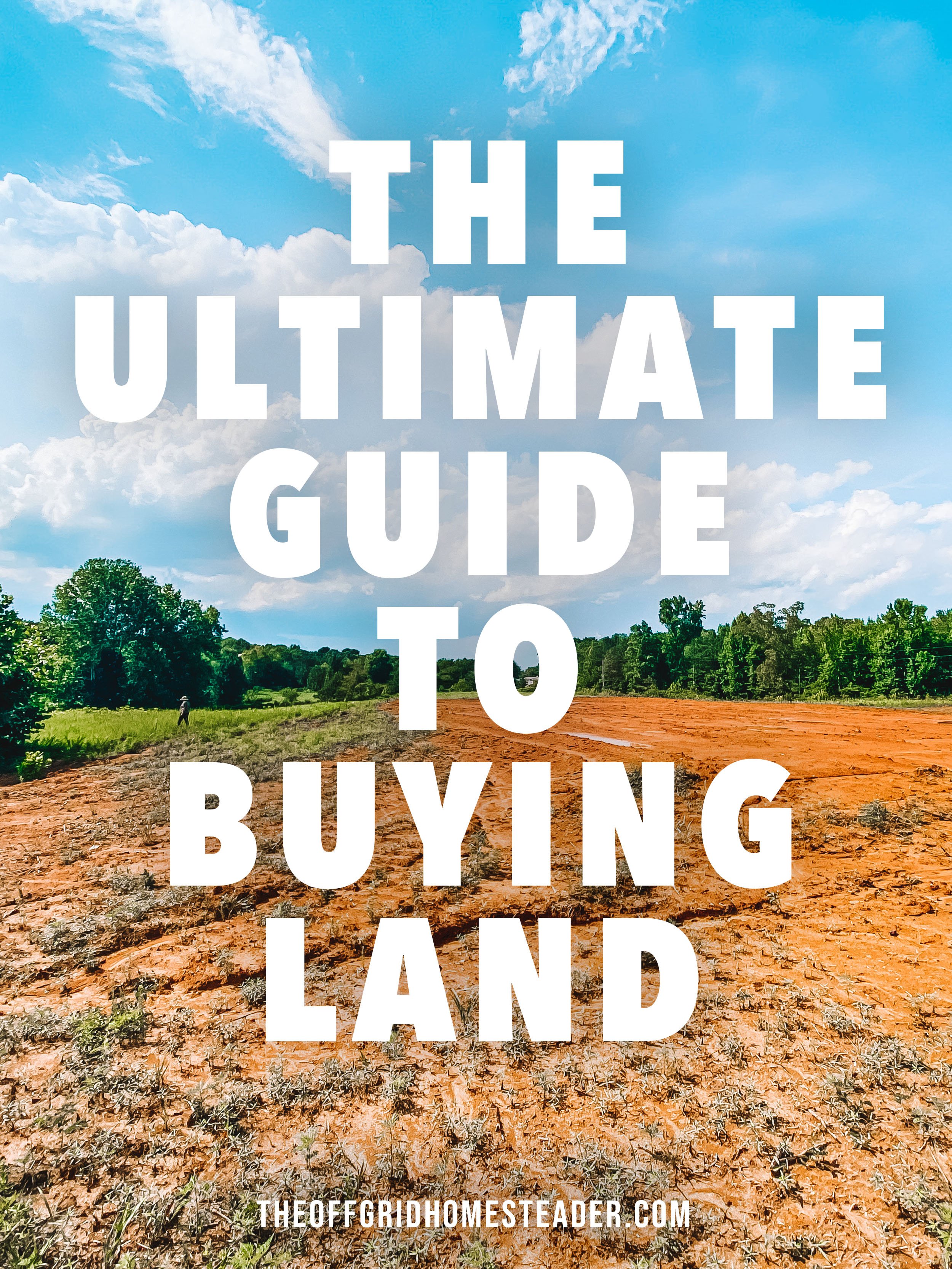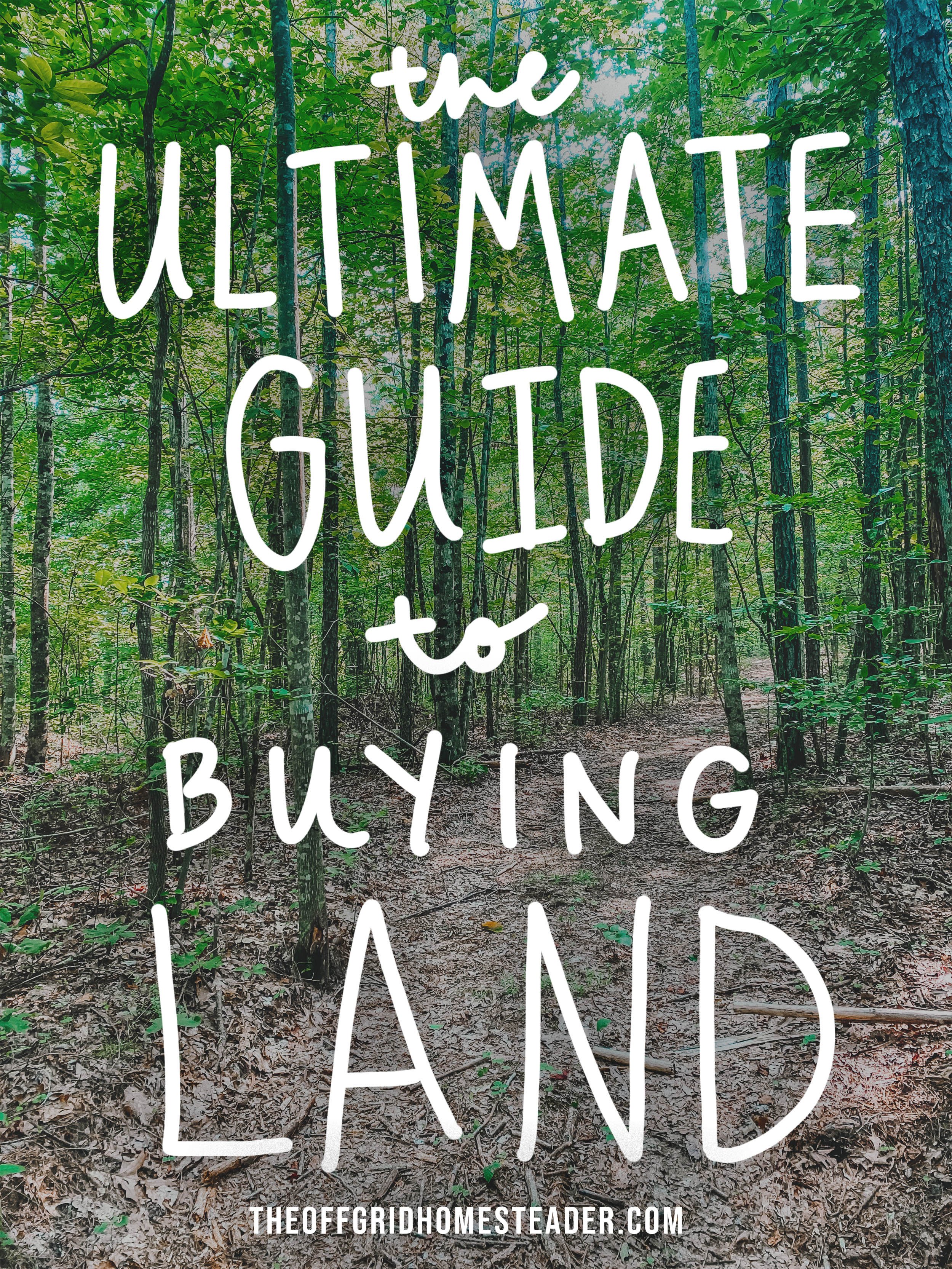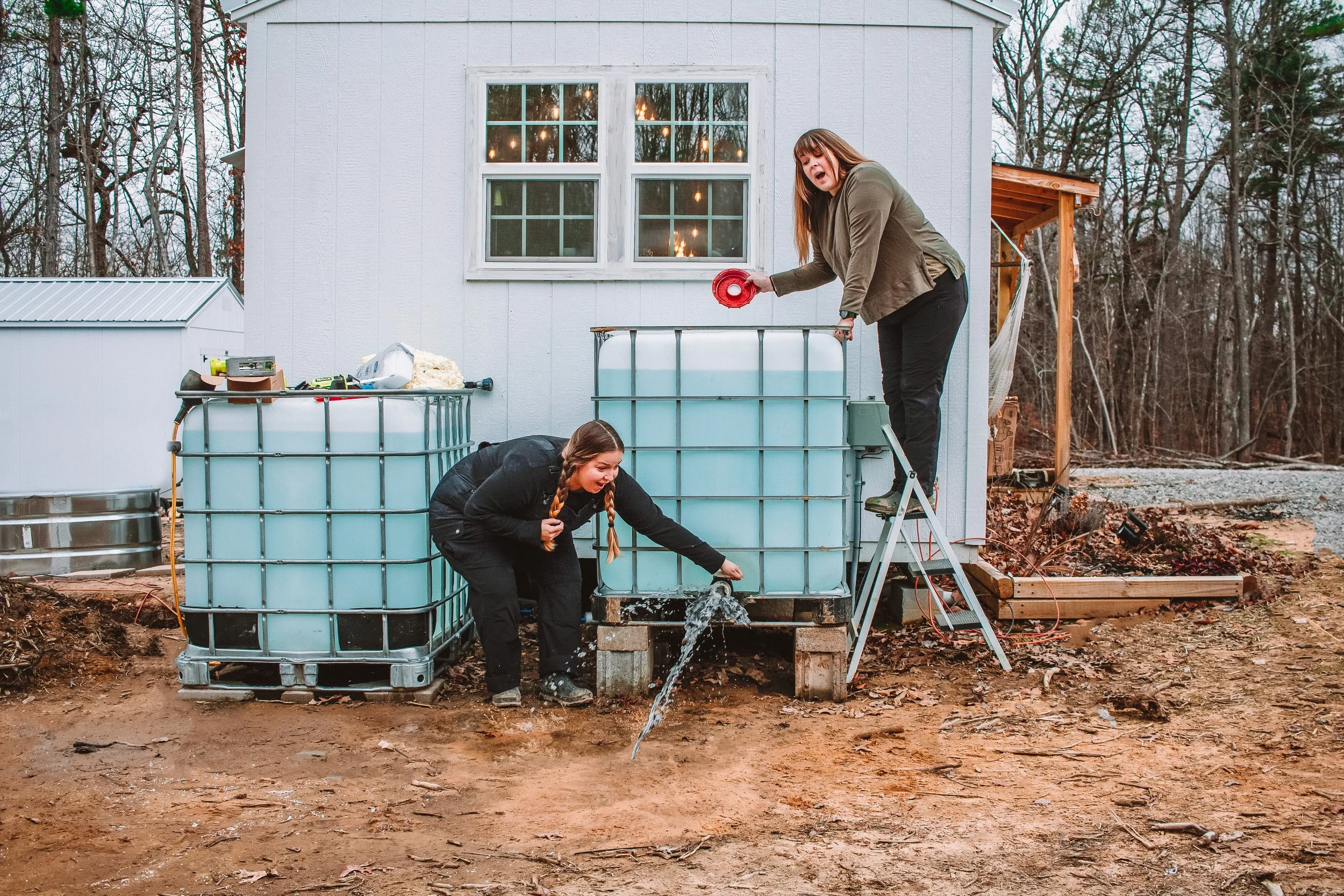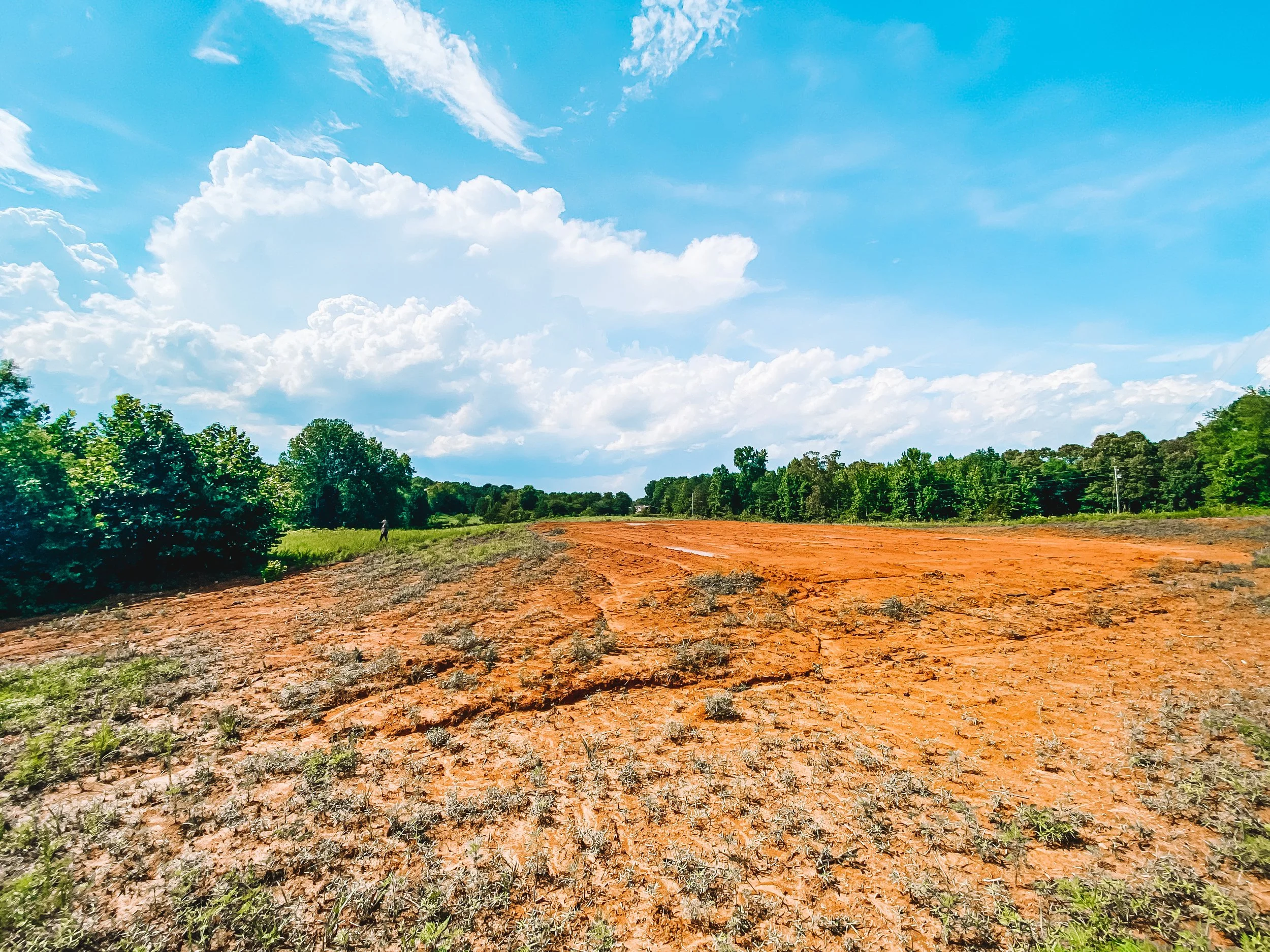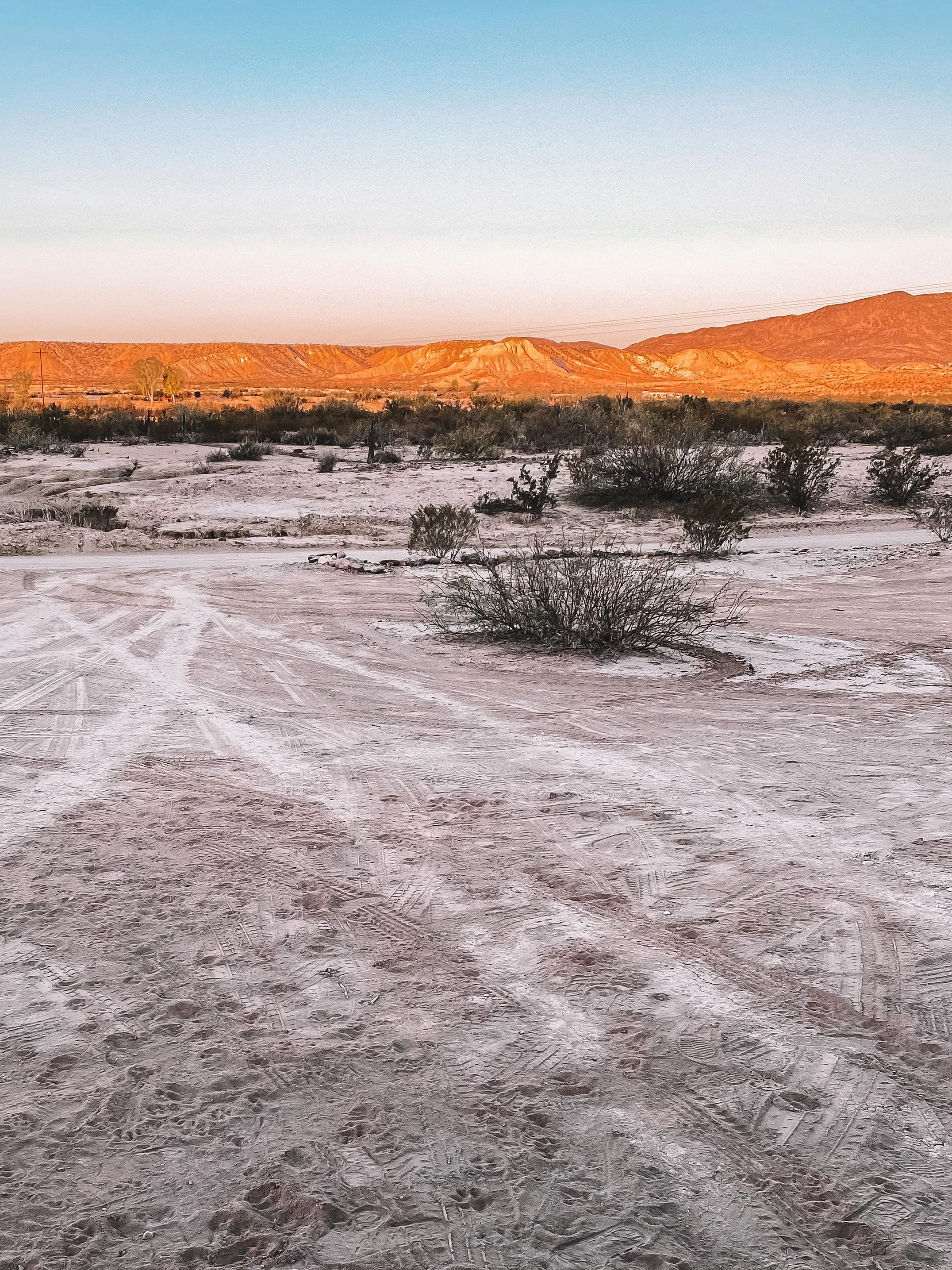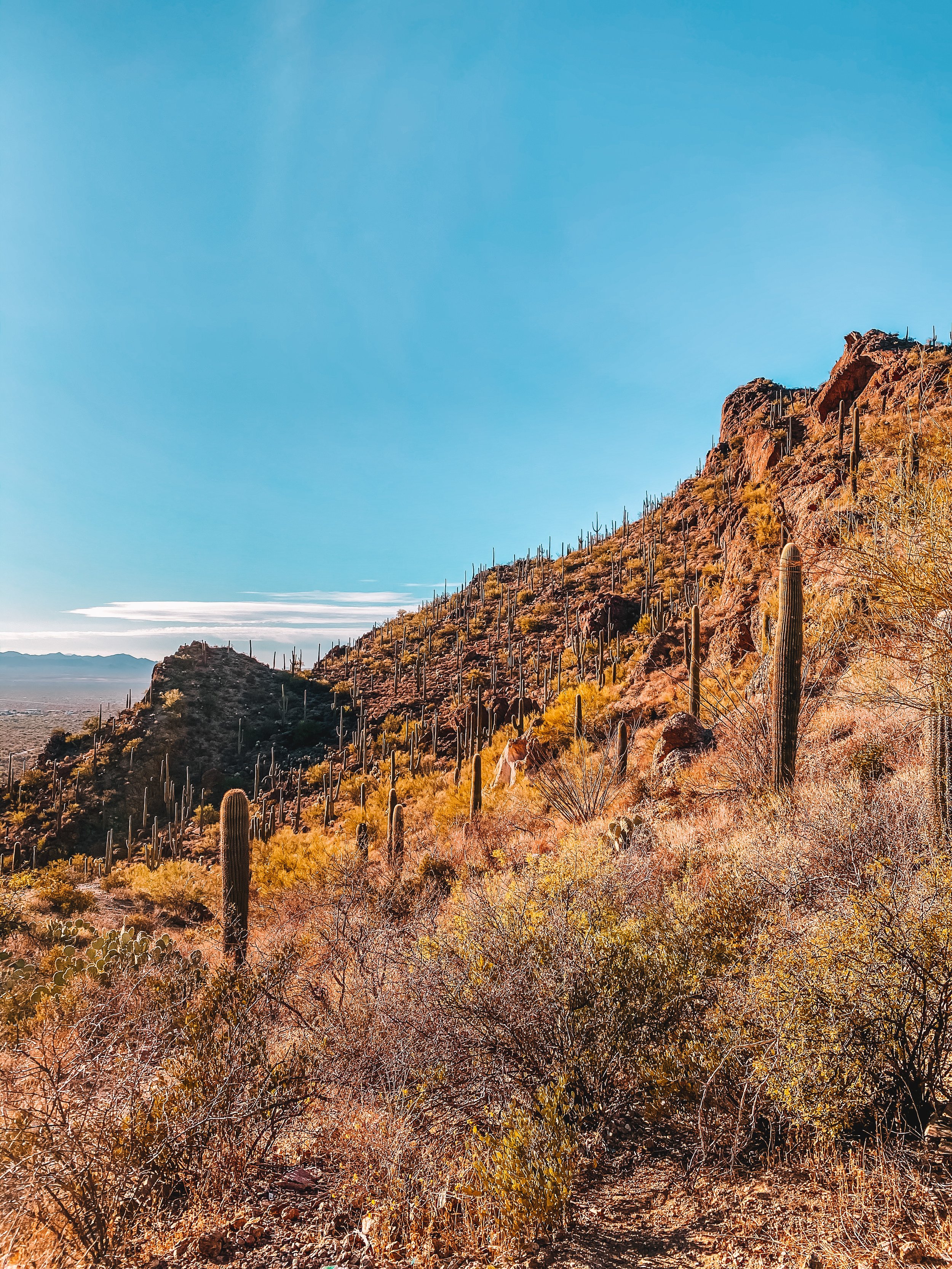The Ultimate Guide to Buying Land
A couple years ago, Casey and I started considering leaving the great city of Nashville and buying land. We had gardened, raised chickens, and traveled off grid, and we really wanted to take our homesteading to the next level. We knew we were limited in what we could do in our 1/3 acre lot in the city. We knew we wanted more space to achieve our goals, but our budget was small. So we started the process of looking for affordable land.
When we first started looking, we didn’t really even know what we wanted out of a property besides space. We realized quickly that buying land is much different than buying a house. Unless you have a big budget, most realtors don’t really want to spend much time showing you a bunch of different properties. In my opinion is better to look for the land yourself and call the seller’s realtor for questions. This means you will have to be your own advocate and you’ll have to know exactly what you are looking for and do your due diligence. All of this can be intimidating and overwhelming. If you are wondering where to find land, I’ve got you covered.
After looking at multiple properties online and in person and talking to a lot of realtors we were able to narrow down what we were looking for in a property. Unfortunately, the prices nearly doubled on properties from the time we first started looking to the time we actually found the one we wanted. But we also didn’t expect the price to go down anytime soon, so we were comfortable with the price of our land.
There is a steep learning curve in buying land and I’ve heard a lot of horror stories of people who bought land that didn’t end up being right for them. One of my biggest takeaways is: Don’t be afraid to call the seller’s realtor and ask questions. Go look at the land and ask more questions. No question is dumb when you are trying to decide if a piece of land is for you.
So, if you are thinking about buying land and you don’t know what to consider or where to start… below are exactly the things you need to consider:
Power Are you looking to be off grid or do you really want to be able to have grid connected electricity run to your property? If you want to be tied to the electrical grid then you best bet would be to already have electricity on the property or have it in close proximity. The cost of bringing electricity will depend on how far your home will be to where there is already an electrical pole. So if you want to set your house a mile back off the road, the cost of getting electricity will be much greater. Make sure to call the electricity company to find out what the costs are per foot to run electricity to your home and everything you need to have in place to make that happen.
If the cost of electricity is going to be high because you aren’t close to electricity, then you may want to look at off-grid power sources. At this point you would need to figure out what your goals are and what the cost of each option is. Getting electricity off-grid is a lot more expensive than people realize. As with everything on this list, do your research!
You may also like: Are you ready for off grid living?
Internet/ Phone/ Cell Service You can usually find out from the realtor what the internet options are for a property. If internet is not offered at the property, you could consider satellite internet. If you work from home, don’t under estimate the importance of good uninterrupted internet. The realtor will also usually know how the cell service is, but this something you can easily find out for yourself when visiting a piece of property. Not everyone has the same cell service, so someone’s phone may work great at a property while yours doesn't. Go there with your phone and check it out. In my opinion none of this should be overlooked. If there is an emergency on your land, you will want a way to contact help.
Water Water is one of the most important things to consider when buying land. If you are within a municipality you will likely be able to get water easily. But if you buy land in a more remote location you may have to consider other options. Well drilling is the first option most people consider. Well drilling can be expensive and could also end with not being able to find water. If the property already has a well, then you will want to get the water tested to make sure it is suitable for drinking. You would also want to know as much about the well pump as possible.
You might be lucky enough that the property you want to buy has a natural water source whether that is a stream, creek, or pond. You will want to know if those bodies of water are clean enough for swimming in or if they are suitable for drinking water (after being filtered of course).You also need to check into water rights for water on your land.
Rain catchment is another option but if you live in the desert, you will have to plan differently than someone who lives in a rainforest climate. There are a lot of resources online that will help you run the numbers on how large of a rain catchment area you will need and how large your storage tanks will be to meet your water needs. Also, rain catchment is NOT illegal anywhere in the United States. This is a common myth I see repeated anytime someone talks about rain catchment. As of right now there are only two states (Utah and Colorado) that restrict the amount of rain you catch, but it is not illegal.
You can also have water storage tanks and get water trucked in. As with everything consider the cost of the tanks and the water. Or maybe you’ll get lucky like us and have a neighbor who you lets you use her water to fill up your water tanks while you wait to get your rain catchment system figured out.
While I did say that water is one of the most important things to consider, be open minded about your water options. There are some unconventional things you can do to drastically reduce your water needs. If you live close enough to a gym with showers you can shower away from home for a period of time. You can also do laundry at a laundromat. Using a composting toilet instead of a traditional flush toilet will also reduce your water needs. If you put all of these ideas into practice, then you would only need water for drinking, cooking, and washing dishes. You would be surprised how little water you need for just those things. This is not ideal and not a way you would want to live forever but it can be done for a short period of time should your situation require this.
you may also like: how to collect rainwater & figure out how much you need to survive
Sewage If you are buying raw land that is in a rural area you will need to find a safe way to dispose of your waste. This is typically done by having a septic tank. You will need to get your land perc tested to make sure the soil is the right condition for a septic tank. If you are going to be putting a septic tank, you will need to do this BEFORE you buy the land. You don’t want to find out after the fact that you can’t do what you had planned. Usually, the city/county will tell you where your septic tank has to go. You don’t want to start building your house where your septic tank is going to have to go.
An alternative to having a septic tank is to have a composting toilet and to have a grey water system. Grey water is the waste water that comes from washing your laundry and dishes, showering, and the water from your sink. Black water is what is flushed down your toilet and the disposal of that is elimanated by having a composting toilet. You will need to check to see the regulations are for composting toilets and grey water systems in the area where your land is.
Climate/ Growing Conditions If you want to grow a lot of your own food, you will want to pick a location that has a long growing season or consider that you may have to grow in a heated green house. Does this area have a lot of droughts? You might also consider this if you are moving from a colder location to a warmer one and vice versa. Maybe summers in Tennessee sound nice to someone who has previously lived in a place where winters are long and cold and dark. But, are you ready for the humidity and bugs that come with that?
Also consider microclimates. In places like California the climate can change drastically without traveling far. The same goes from living in a valley vs on a mountain. Does this area get a lot of hail? Wind? Tornadoes? Wildfires? Most of these things you will already know if you already live near by. What I hear from a lot of people who move from the west coast to the south, is that they weren’t prepared for the bugs and humidity. I am always surprised at how many people will pack up and leave one part of the country to another without considering something like the climate + growing conditions.
Soil If you want to grow food, it would be good to know if the soil is good. Having a bad soil doesn’t mean you shouldn’t buy the property but you will need to consider the time and money that it will take to revive the soil. You can often get great deals on land that has poor soil conditions and there are many permaculture and organic practices that will bring that sad soil back to life. The movie, Biggest Little Farm is a great encourager and resource for reviving dead soil.
Something else to consider is how deep the soil is before you hit bedrock and how many rocks there are in the soil. You can amend soil until the cows come home but soil that is mostly rock is going to be a challenge and will be a nightmare if you have to do any digging. In this case, raised garden beds would be your best bet. But building could cost more and be more challenging.
Your local agricultural department is a great resource or getting your soil tested and there are several tests you can run. The tests are inexpensive and they can test for soil contaminants, how much organic matter is in your soil, soil composition, etc. Across the board if you are interested in homesteading, farming, gardening, and/or off-grid living, your Ag department is an invaluable resource.
Location If you’ve lived in a city all your life and your dream property is an hour from a city, you may have a hard time adjusting. Don’t make the mistake of glamorizing country living if you’ve never done it before. How close is a hospital or doctors office? Grocery store? Restaurants? What are the schools like near by? What is the local job market like? Do you need 4WD to get to the property? That would mean your guests would also need that.
Community This one is harder to figure out until you’ve lived an area for a while. One way to get some insight into the community is through Facebook. If you have a lot of time to buy land, you could join local community pages of areas where you are interested in buying to get a feel for the area. If you live rural visit the closest small towns and drive through them. Visit some churches. Eat at the local restaurants. Talk to local business owners. If community is important to you what you want to see is a mix of the young and old. You want to see thriving local businesses and a close knit and active community. The local community is something I see overlooked the most and it’s also the hardest to figure out but it plays a bigger role in our lives than we realize.
Neighbors You could find a dream property that is priced just within your budget but if you have neighbors are from hades, your dream property is now a nightmare. You don’t always have the chance to know your neighbors but you can tell a lot by driving around. Think about the things that matter to you. Is there a lot of trash in the neighbors yard? (Some people care about this and some don’t.) Are there loose dogs running around? While bad neighbors might make you want to move, good neighbors are a dream come true. The best way to get good neighbors is to be a good neighbor yourself.
Budget Obviously, when you are looking at land you have a budget in mind. But don’t forget to think about the costs of getting infrastructure built. If you are buying raw land consider the cost of clearing the land, perc test, driveways, getting water + electrical, fencing, animal structures, etc. All of those costs add up quickly and can often cost more than your house will. A cheap piece of property could end up costing more than a more expensive property, so consider all the costs involved.
Financing The best case scenario for buying land is to pay with cash because it can be hard to get financing for buying land, unless there is already a house on the property. You have a better chance getting financing for land if you are also building a house on it. You certainly need to do your research and talk with your bank about your options.
One option for getting the money for your land is through owner financing. Owner financing is when you get financing from the landowner directly. They typically won’t check your credit which is a plus if you don’t have good credit. You will typically pay a higher interest rate than you would for a traditional mortgage but the payment time is usually shorter (3-5 years). You will also make a down payment. The terms of the financing can often be negotiated and like the housing market the flexibility of the seller all comes down to demand.
There are plenty of downsides to owner financing. When you buy land the title company will do a search and make sure there are no liens on the property. The property may not have current liens but that doesn’t mean the landowner won’t get a lien while you are still making payments. If he/she were to get a lien on the property while you are still paying it off, the land owner would be responsible for that lien. However there is no guarantees that he/she will pay to get that lien removed. The landowner would be required to pay you back for what you’ve paid on the land but you will have to get in line with his/her other creditors.
Also, while some landowners will let you start building on their land before it’s paid off, if you defaulted for some reason, you would lose everything that you had put into that land. Owner financing has worked out for a lot of people but just make sure you know what you’re getting into and you consider everything before making this decision.
Zoning/Codes/Restrictions/Permits If you want to live off grid or live in an unconventional home like a shed or earthbag home you really need to make sure you understand the city and county codes. Something I see people get wrong all the time is thinking a property with no restrictions means they can do what they want on their property. When a property doesn’t have restrictions that means it doesn’t have deed restrictions which means that the current owner and/or any previous owner hasn’t put any restrictions on the property. This has nothing to do with the local codes and zoning for your particular property. For example, a deed restriction might be that you can’t run a commercial chicken or pig operation on your property. You will mostly see restrictions in gated communities and areas with HOAs but not always. Sometimes people simply don’t want certain things to ever happen on their land. However, you could find a property that has zero restrictions but is in a city/county that is zoned so that you could not have a short term rental on you property. Some municipalities only allow one home per a certain number of acres.
Other zoning issues are: Do they allow tiny homes? Shed homes? What is the process of getting electrical and building permits? I have heard of countless stories of people having to sell their tiny homes or shed homes because they were in a city/county that didn’t allow that. They thought their unrestricted property allowed for that. It is so important to consider everything you want to do with your property and everything you might want to do with it so that you have the proper zoning/codes.
you may also like: what to consider before turning a shed into your home
Land Composition/Topography Before you even go look at a piece of land call and ask the realtor how much of the acreage is useable? A piece of land could be 5 acres but only 1/2 acre is useable because the rest is on a steep slope. Those 4.5 acres really wont do you much good, so make sure you aren’t wasting your time and find out before you go.
Consider the grade of the property and where water pools and sits. You don’t want to put your house in a spot that is just catching water. Think of what your plan is for dealing with water drainage issues.
A property covered in trees will not likely serve someone who wants to have a herd of cows. You can convert forested land to pasture land but it takes time. Also, it’s challenging to get a feel for a property covered in trees. Sometimes the brush is so thick you can’t easily walk through it. All of this adds to the cost of clearing land.
If you plan to cut trees down, you also have to have a plan for what you will do with those trees. How are you getting rid of the stumps? I could write a whole other blog post on all the things to consider when clearing land but just know there is a lot to consider and a lot of cost. The plus to land covered in trees is that you can usually get a good deal on it. Make sure to pay attention to the condition of and the types of trees on the land. Is this a second growth forest or are there 70 year old oak trees that have high lumber value? A word of caution when getting excited about the potential for logging your land- most logging companies won’t even mess with your land if you don’t have a certain number of acres for them to log. So you may have 5 acres of high value trees but you may have to cut those down yourself or pay someone to cut them down and then sell them.
There are a lot of things to consider when buying a piece of land and one the best tips I can give you is to make a spreadsheet. What I realized quickly is that I would forget if I had already called about a property. So the spreadsheet came in handy because I would make sure to put down every property we were interested in and whether or not I had already called about it. I made a notes section so that I could write any other details I discovered. We also marked out properties that we had decided were a definite “no” and we would refer to that spreadsheet a lot. When you are looking at hundreds of properties online it’s hard to keep everything straight. Sometimes a property would come up in our search that looked interesting and then I’d refer to the sheet and realize that I had already marked that a “no” for one reason or another.
I wish I could write a guide that told you exactly how you know if a property is the right one for you. There is a balance between finding the perfect property and taking a leap of faith. You don’t want to become paralyzed by waiting for the perfect property but you also don’t want to settle. What I can tell you from a year long search and seeing dozens of properties in person: we knew when we found the right one. I hope that is your experience as well.
